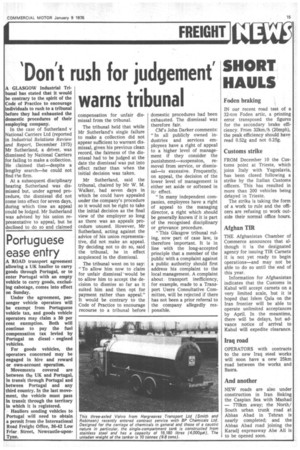'Don't rush for judgement' warns tribunal
Page 17

If you've noticed an error in this article please click here to report it so we can fix it.
A GLASGOW Industrial Tribunal has stated that It would be contrary to the spirit of the Code of Practice to encourage Individuals to rush to a tribunal before they had exhausted the domestic procedures of their employing company.
In the case of Sutherland v National Carriers Ltd (reported in Industrial Relations Review and Report, December 1975) Mr Sutherland, a driver, was dismissed by National Carriers for failing to make a collection. He claimed that—despite a lengthy search—he could not find the firm.
At a subsequent disciplinary hearing Sutherland was dismissed but, under agreed procedure, the dismissal did not come into effect for seven days, during which time an appeal could be lodged. Mr Sutherland was advised by his union representative to appeal, but he declined to do so and claimed compensation for unfair dismissal from the tribunal.
The tribunal held that while Mr Sutherland's single failure to make a collection did not appear sufficient to warrant dismissal, given his previous clean record, the fairness of the dismissal had to be judged at the date the dismissal was put into effect rather than when the initial decision was taken.
Mr Sutherland, said the tribunal, chaired by Mr W. M. Walker, had seven days in which he could have appealed under the company's procedure so it would not be right to take the initial decision as the final view of the employer so long as there was an appeals procedure unused. However, Mr Sutherland, acting against the advice of his union representative, did not make an appeal. By deciding not to do so, said the tribunal, he in effect acquiesced in the dismissal.
The tribunal went on to say: "To allow him now to claim for unfair dismissal`would be to allow him to accept the decision to dismiss so far as it suited him and then opt for payment rather than appeal." It would be contrary to the Code of Practice to encourage recourse to a tribunal before domestic procedures had been exhausted. The dismissal was therefore fair.
CM's John Darker comments: "In all publicly owned industries and services employees have a right of appeal to a higher level of management if they consider the punishment—suspension, removal from service, or dismissal—is excessive. Frequently, on appeal, the decision of the lower level of management is either set aside or softened in it effect.
"In many independent companies, employees have a right of appeal to the managing director, a right which should be generally known if it is part of the recognised disciplinary or grievance procedure.
"This Glasgow tribunal ruling, now part of case law, is therefore important. It is in line with the long-accepted principle that a member of the public with a complaint against a public authority should first address his complaint to the local management. A complaint about transport inefficiency, for example, made to a Transport Users Consultative Committee, will be rejected if there has not been a prior referral to the company allegedly responsible.




















































































